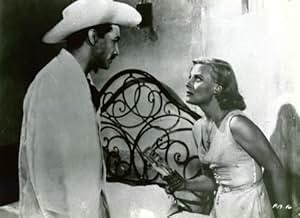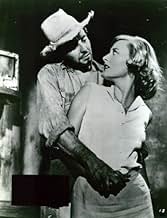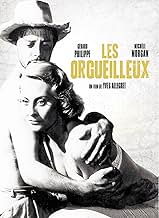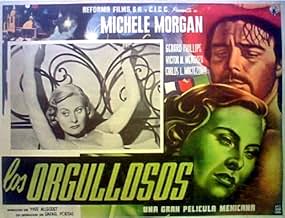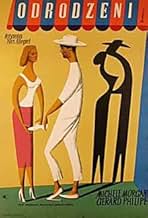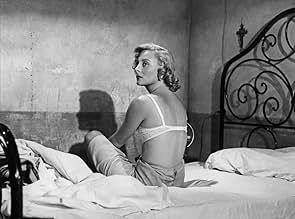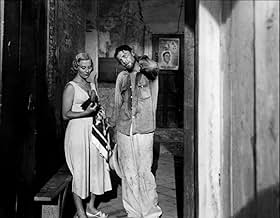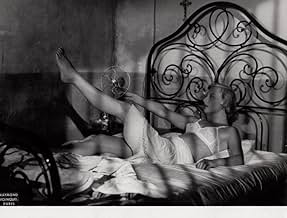Life in a small Mexican village where joy and misery, hope and pain, passion and guilt, love and decay, life and death are mixed in the peasants life and two French citizens who end up stran... Read allLife in a small Mexican village where joy and misery, hope and pain, passion and guilt, love and decay, life and death are mixed in the peasants life and two French citizens who end up stranded in there, during a typhoid epidemic.Life in a small Mexican village where joy and misery, hope and pain, passion and guilt, love and decay, life and death are mixed in the peasants life and two French citizens who end up stranded in there, during a typhoid epidemic.
- Nominated for 1 Oscar
- 1 win & 3 nominations total
Luis Buñuel
- Smuggler
- (uncredited)
Featured reviews
Jean-Paul Sartre did not have much luck with his screenplays for French Pathé as only two of eight saw the light of day, one of which, 'Les Jeux sont faits' was directed by Jean Delannoy whilst the other, entitled 'Typhus', eventually surfaced some ten years later as 'Les Orgueilleux' which retained distant echoes of the original. Ironically Sartre was nominated for an Academy Award but unsurprisingly withdrew his name.
Directed and adapted by Yves Allégret with contributions from the legendary Aurenche and Bost, it is set in a fly-blown harbour town during a meningitis epidemic and stars two of France's finest, Gérard Philippe and Michele Morgan, both of whose class enables them to rise above the grubby milieu. Philippe both excels and engages one's sympathy in a role that could so easily be a caricature. Mlle Morgan's innate sensuality is singularly sweaty here and Martin Scorcese admits that the sight of her lying on a bed in her lingerie whilst cooling herself with ice cubes 'troubled his adolescence'.
Cinematographer Alex Phillips has brillianty captured the seedy surroundings and oppressive heat but the soundtrack of yelping musicians becomes rather tiresome.
The final Hollywood-style clinch is not the ending that Allégret would have chosen and was apparently shot by an operator in the Boulogne studios against a painted sky.
Allégret had reached his peak with three 'noirs' in the 1940's and this work from 1953 is generally regarded as his last film of note.
Directed and adapted by Yves Allégret with contributions from the legendary Aurenche and Bost, it is set in a fly-blown harbour town during a meningitis epidemic and stars two of France's finest, Gérard Philippe and Michele Morgan, both of whose class enables them to rise above the grubby milieu. Philippe both excels and engages one's sympathy in a role that could so easily be a caricature. Mlle Morgan's innate sensuality is singularly sweaty here and Martin Scorcese admits that the sight of her lying on a bed in her lingerie whilst cooling herself with ice cubes 'troubled his adolescence'.
Cinematographer Alex Phillips has brillianty captured the seedy surroundings and oppressive heat but the soundtrack of yelping musicians becomes rather tiresome.
The final Hollywood-style clinch is not the ending that Allégret would have chosen and was apparently shot by an operator in the Boulogne studios against a painted sky.
Allégret had reached his peak with three 'noirs' in the 1940's and this work from 1953 is generally regarded as his last film of note.
`Les Orgueilleux' is one of a constellation of worthy French movies of this era that the French stopped making for two reasons: the complete lobotomy of the intellect that was the so-called New Wave and the premature death of Gérard Philipe, one of the century's finest actors. His pairing with Michèle Morgan here is inspired. (They also starred in René Clair's `Les Grandes Manoeuvres'.) In order to describe Philipe's charm, one has to evoke equal parts Leonardo DiCaprio and Laurence Olivier and imagine them cast as romantic leads in the kind of challenging narrative that is not even conceivable today, except for the odd exception. `Les Orgueilleux' is set during a typhus epidemic in a remote Mexican village and is based on Jean-Paul Sartre's novel `L'Amour rédempteur' (`Redeemed by Love', aka `Typhus'). The oversimplification of the novel's themes is compensated by Allégret's penchant for realism and his attention to details, like the long scene of Morgan enduring the discomfort and perils of a lonely hotel room during a heat wave in a third rate Mexican hotel, which is part striptease (daring for the time) and part psychological analysis. In other words, a perfect blend of commercialism and intelligence, both qualities sadly lacking from the aforementioned so-called New Wave.
I saw this movie when it first came out, have not seen it since, but have remembered it vividly all these years. Seldom, if ever, has a film held me riveted the way this one did. Of course, I would have paid to see Michele Morgan read the Manhattan phone book, especially attired in a slip (no, I am not a lezzie). The mood created by the meningitis epidemic in Mexico and the sexual tension, created mostly by Morgan, are more enveloping than real life. This remains one of my top 10 - perhaps top 5 - favorite movies of all time. For the life of me, I cannot understand why there is neither a VHS nor a DVD version available, apparently anywhere. What can be done to rectify this situation? For years, I moaned about the lack of a DVD of The Informer. Now, one is available but only as part of the overpriced John Ford collection of some of his lesser films.
Jen
Jen
Allegret reached his peak in 1947-1949 with "Dédée d' Anvers" "une si jolie petite plage" and "manèges".Afterwards,his works became either disastrous ("la jeune folle" ) or academic (Zola's "Germinal")."Les orgueilleux" is a notable exception.Gerard Philippe's over the top portrayal of an always drunk deposed doctor is impressive.Michèle Morgan has never been so sensual.But what matters is the sultry moist atmosphere.Michèle Morgan is sweating throughout the whole movie.Very few things happen after Morgan's husband's death,but the depiction of a Mexican one-horse town during the Holy week is awesome.One could draw a parallel(almost bunuelian) between the Passion and Morgan's sentimental life:death on Good Friday of what she thought was the love of her life;resurrection on Easter day on the beach when she realizes she's found true love.
Yves Allégret was extraordinary when it came to making you FEEL what his characters endure:so strong the pictures are that we're hot,we sweat as much as them.He did the same in "une jolie petite plage" where the rain never stopped falling.Maybe he learned his lesson from Victor Sjostrom(Seastrom) who could make us feel" the wind" ,and in a silent movie at that.
Yves Allégret was extraordinary when it came to making you FEEL what his characters endure:so strong the pictures are that we're hot,we sweat as much as them.He did the same in "une jolie petite plage" where the rain never stopped falling.Maybe he learned his lesson from Victor Sjostrom(Seastrom) who could make us feel" the wind" ,and in a silent movie at that.
Story of a land more than story of characters. Admirable performance of Michelle Morgan. And sure, Gerard Philipe. You feel the heat and the poverty and the air. And, sure, the traits of love. A film like the picture of a world. And a love story as root of hope.
Did you know
- TriviaJean-Paul Sartre wrote ten drafts for screenplays to be used by Columbia Pictures, of which only three were typed down. The other seven were sort of rejected, and one of these, 'Typhus' came to be the obvious inspiration for Les orgueilleux/Los Orgullosos, Yves Allégret's co-production with Mexico. The film won the Bronze Lion in the 1953 Venice Film Festival, ex-aequo with Hommes en détresse (1953), Le port de la drogue (1953), and Sinhá Moça (1953), and also a Special Prize from the same Jury. When the film was nominated for Best Writing, Motion Picure Story, for the 1957 Academy Awards - in the wake of the film's release in the USA, with promotional materials emphasizing it was "Jean-Paul Sartre's The Proud and the Beautiful", the French philosopher disowned his authorship. The film has also been said to be based on Sartre's novel, "L'amour redempteur"... which he never wrote! This myth did not end, even after its exposure as such in "Feature Cinema in the 20th Century: Volume One: 1913-1950: a Comprehensive Guide", by By Jacek Klinowski et al.
- ConnectionsFeatured in Censura: Alguns Cortes (1999)
- How long is The Proud and the Beautiful?Powered by Alexa
Details
- Release date
- Countries of origin
- Languages
- Also known as
- The Proud and the Beautiful
- Filming locations
- Production companies
- See more company credits at IMDbPro
- Runtime1 hour 43 minutes
- Color
- Sound mix
- Aspect ratio
- 1.37 : 1
Contribute to this page
Suggest an edit or add missing content


